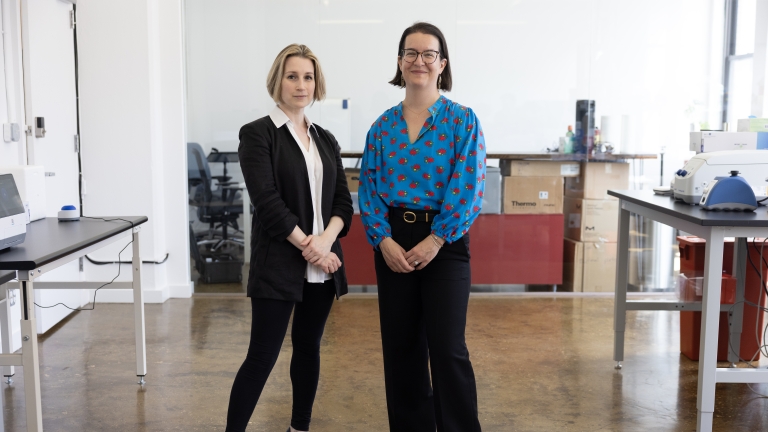Imprint Labs Announces $15M in Funding to Decode the Immune System, Facilitate Chronic Disease Research

Imprint, a Focused Research Organization building forensic immunology tools, aims to uncover the relationships between the immune system and chronic disease, including neuropsychiatric disorders
NEW YORK, NY—Imprint Labs, a new nonprofit initiative, announced today it has raised $15 million in philanthropic funding to advance its work to decode the body's immune memory and uncover the causes of chronic diseases. Imprint, a Focused Research Organization (FRO) catalyzed by Convergent Research, is pioneering new technologies to identify what triggers conditions like autoimmune disease, long COVID, and neuropsychiatric disorders by decoding the historical information stored in immune cells.
Millions of people suffer from immunological diseases and other chronic conditions that may be linked with immunological triggers. Some autoimmune diseases, which impact over 50 million Americans, are initially triggered by infections, injuries, and tumors. 6% of patients with acute COVID-19 infections go on to develop long COVID. And emerging evidence suggests that a significant subset of the nearly 1 billion cases of mental illness worldwide may stem from underlying immunological causes.
The initial causes of chronic conditions, such as triggering infections, can occur years prior to the diagnosis of the chronic disease itself. Longitudinal studies to identify these triggers are often prohibitively expensive or logistically infeasible. For example, one recent study linking Epstein-Barr virus and multiple sclerosis used a database of 10 million people followed over 20 years. Because the immune system carries an imprint of everything it encounters, using a snapshot of disease information stored in memory immune cells could offer an inexpensive method to infer what triggered a disease.
“We may not know what’s causing chronic disease—but the immune system probably does,” said Beck Brachman, PhD, CEO and co-founder of Imprint, last month from the TED stage. “In addition to being an army, the immune system is also an archive. We founded Imprint on the thesis that the immune system’s historical archive can be accessed and translated to identify unknown causes of chronic disease, enabling the development of diagnostics, treatments, and even cures.”
Imprint is building tools to reconstruct immune histories from memory B cells and T cells at scale. This ‘forensic immunology’ approach aims to unlock the secrets held within memory immune cells, which contain an archive of all immune exposures throughout a person’s life—essentially a web browser history of diseases and their hidden triggers. Unlike an individual’s genes, the relevant signal stored in the immune repertoire is distributed, sparse, and constantly evolving, making it an order of magnitude more difficult to resolve than the genome.
“Foundational datasets and new machine learning approaches are required to decode the immune archive at scale,” says Victor Greiff, PhD, co-founder and Director of Computational Immunology at Imprint. “Current efforts largely focus on how antibodies recognize single targets, but important disease signatures can only be detected by investigating the immune system as a whole.” Imprint’s forensic tools and methodology will ultimately allow researchers to reconstruct individualized immune repertoires, identify patterns within and between patients’ unique immune repertoires, and explore relationships between immune exposures and chronic conditions like long COVID, multiple sclerosis, and depression. Initial funding will be used to establish Imprint’s high-throughput data generation pipeline, build its first computational tool, and pilot disease applications.
“We built Convergent Research to support FROs, like Imprint, that are moonshot efforts to create new tools and datasets that will close critical gaps and massively advance our ability to do science,” said Adam Marblesone, PhD, co-founder and CEO at Convergent Research. “The immune record is a robust system that we still can’t read, and our scientific tests often come up short when we inquire into the root causes and mechanisms of chronic illnesses, especially when it comes to what we now think of as brain diseases. Researchers need better tools, and that’s why it’s so exciting that the brilliant team at Imprint is at work to bridge that critical gap in our immunological understanding.”
Imprint has received philanthropic support from Eric and Wendy Schmidt, Convergent Research, Peter Reinhart, and the New York City Economic Development Corporation (NYCEDC). NYCEDC has selected Imprint as a 2025 LifeSci NYC Expansion Fund awardee, a funding opportunity for high-growth life sciences companies interested in expanding their operations in New York City. The LifeSci NYC Expansion Fund is supported by LifeSci NYC, a $1 billion initiative overseen by NYCEDC to position New York City as the global leader in life sciences and grow the ecosystem to 40,000 jobs over the next 15 years.
“New York City is cementing itself as a global leader in life sciences and paving the way for cutting-edge innovation—like the work happening at Imprint—to emerge right here in the heart of the city,” said NYCEDC Chief Strategy Officer Cecilia Kushner. “We are proud to support trailblazing companies like Imprint whose groundbreaking work will help accelerate scientific discovery and life science jobs in NYC, while uncovering the cause of chronic diseases and enabling people all around the globe to live longer.”
In addition to funding support provided by the city, Imprint was incubated by Cornell Tech, one of the city’s premier research institutions. “Imprint exemplifies the kind of bold, translational science we champion at Cornell Tech's Runway Program—science that moves beyond the lab to deliver real impact,” said Dr. Fernando Gomez-Baquero, Director of the Runway Startup Postdoc and Spinout Program at Cornell Tech and member of Imprint’s Board of Directors. “By decoding the immune system’s memory, Imprint is unlocking a frontier of discovery that could change how we diagnose, treat, and even prevent chronic disease. We’re proud to have helped Dr. Brachman catalyze this vision and to support the computational and scientific infrastructure that will drive a deeper understanding of autoimmune and neuropsychiatric disorders.”
To learn more about Imprint’s work to decode the immunological archive, or to partner with Imprint, visit imprint.org. If you are interested in joining our team, visit imprint.org/jobs.
About Imprint
Imprint Labs is a forensic immunology Focused Research Organization (FRO) building experimental and machine learning tools to identify the hidden causes of and cures for chronic diseases. Not only an army, the immune system is also an archive: we aim to decode that archive at scale and reconstruct disease signatures from memory immune cells. A nonprofit startup, Imprint is on a quest to extend the immunotherapy revolution beyond cancer to autoimmune, neurological, and psychiatric disorders. To learn more about forensic immunology and the work Imprint is doing, visit imprint.org.
Imprint Press Contact
Josh Jones-Dilworth
[email protected]
917209-2956
About Convergent Research
Convergent Research brings together scientific founders and funders to design, launch and operate Focused Research Organizations (FROs) across a range of fields. Our FROs, like Imprint, build pivotal infrastructure that bridges gaps to breakthrough scientific research, proving out a new operating model for science that enables a high level of team science and systems engineering for public goods creation.
Convergent Press Contact
Joseph Fridman
[email protected]
516-276-9367
About NYCEDC:
New York City Economic Development Corporation is a mission-driven, nonprofit organization that works for a vibrant, inclusive, and globally competitive economy for all New Yorkers. We take a comprehensive approach, through four main strategies: strengthen confidence in NYC as a great place to do business; grow innovative sectors with a focus on equity; build neighborhoods as places to live, learn, work, and play; and deliver sustainable infrastructure for communities and the city's future economy. To learn more about what we do, visit us on Facebook, Twitter, LinkedIn, and Instagram.
About Cornell Tech & Runway:
Cornell Tech is Cornell University’s state-of-the-art campus in New York City that develops leaders and technologies for the AI era through foundational and applied research, graduate education, and new ventures. Located on Roosevelt Island, the growing campus was founded in partnership with the Technion-Israel Institute of Technology and in close collaboration with the NYC Economic Development Corporation after Cornell won a worldwide competition initiated by Mayor Michael R. Bloomberg’s administration to create an applied sciences campus in New York City. More than 1,000 Cornell students are now educated annually on the campus, including 700 in Cornell Tech programs.
Since opening in 2012, nearly 120 new companies have spun out from startup programs at Cornell Tech, and 95 percent of them are based in New York City. Cornell Tech continues to have a transformative economic impact on the region’s tech sector.

